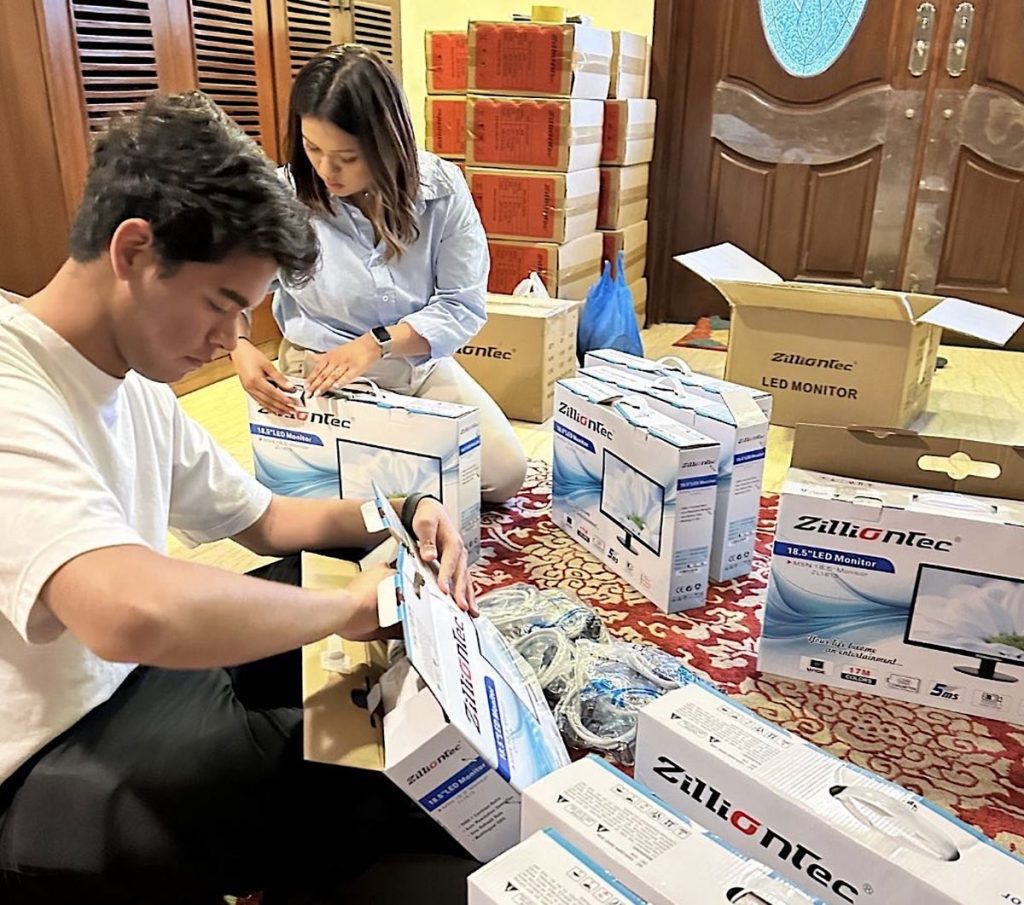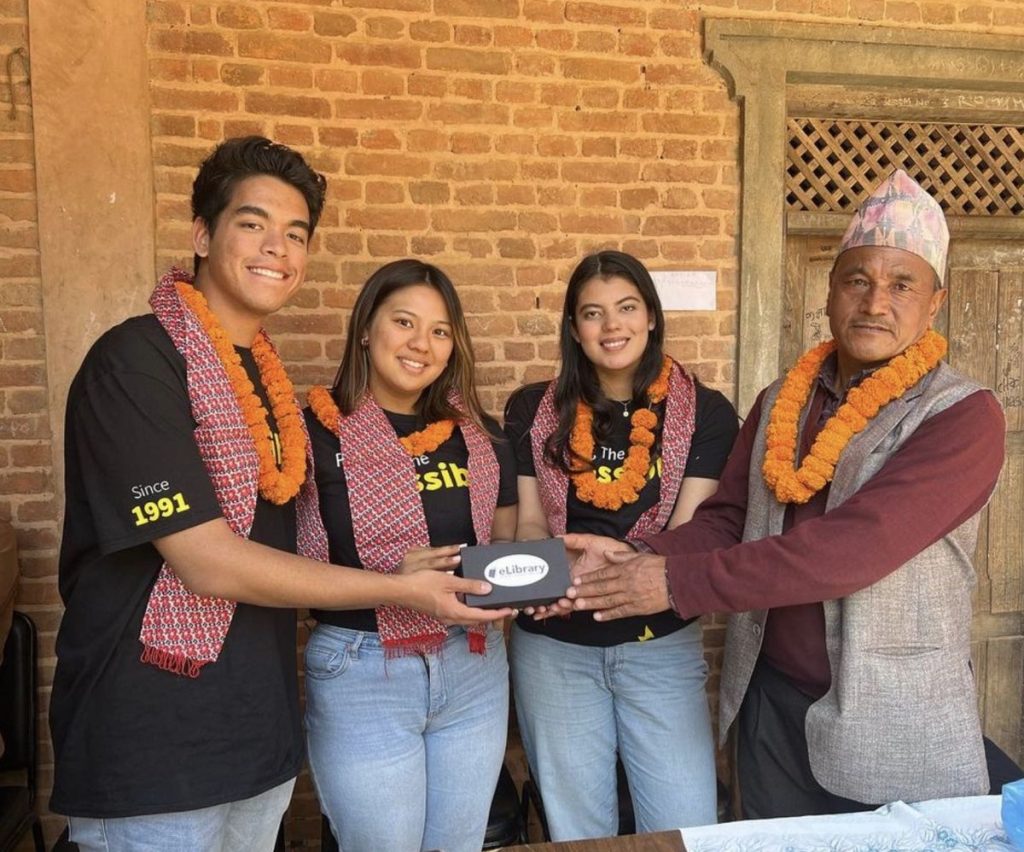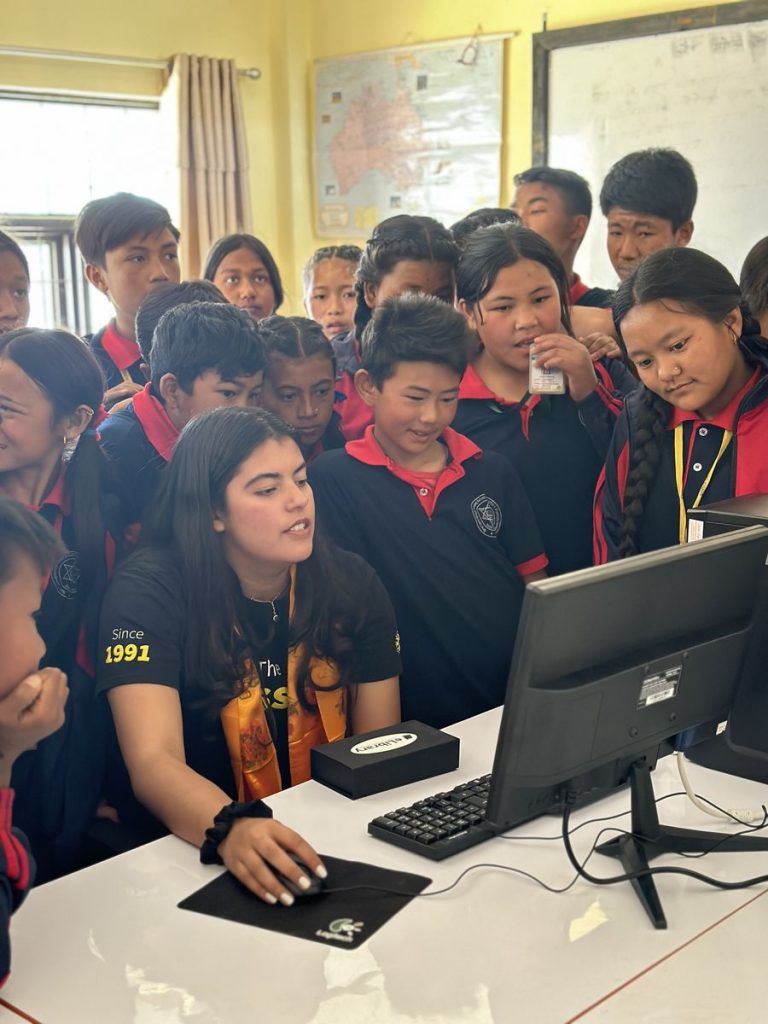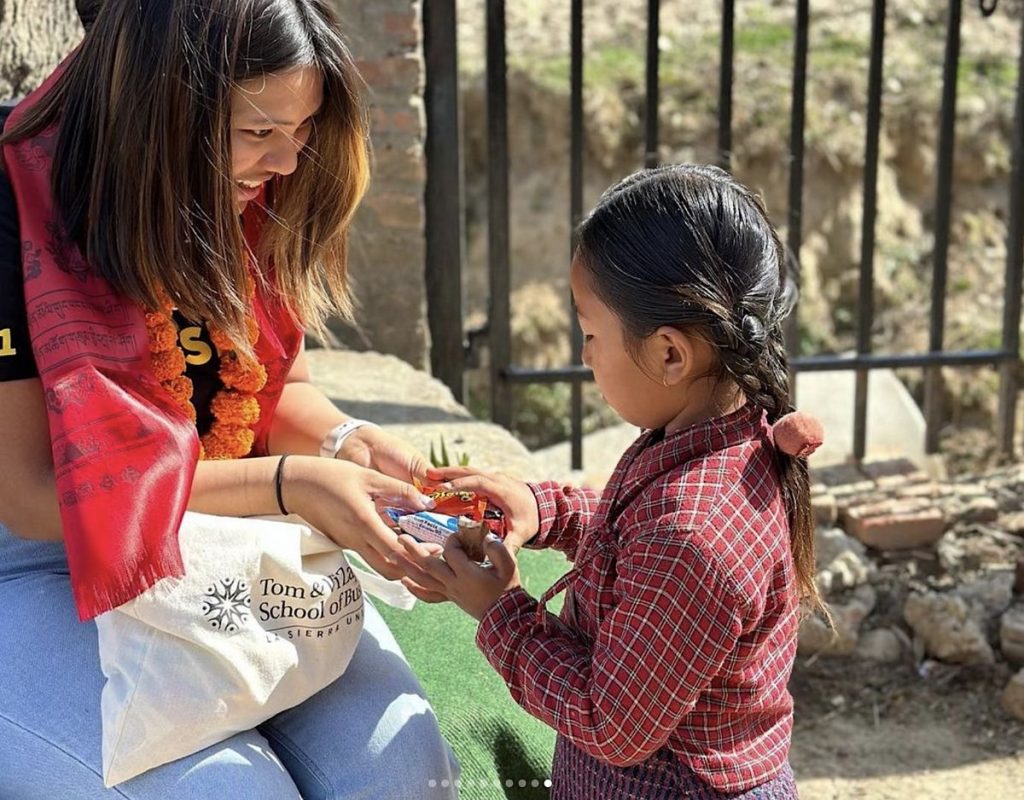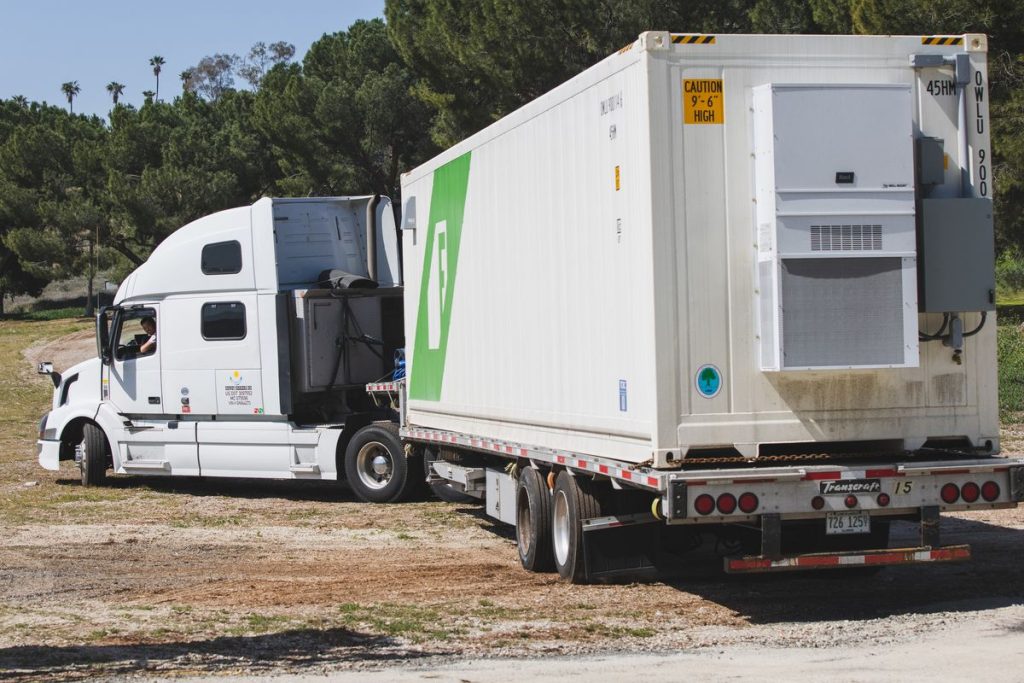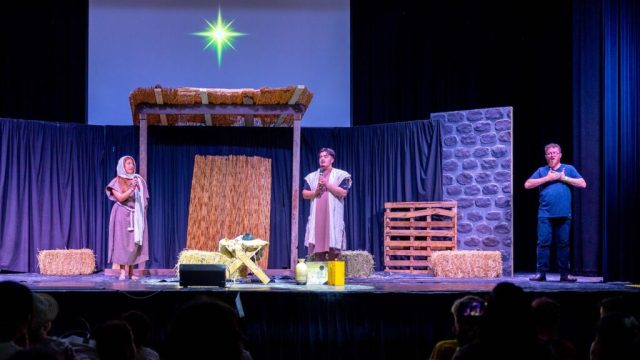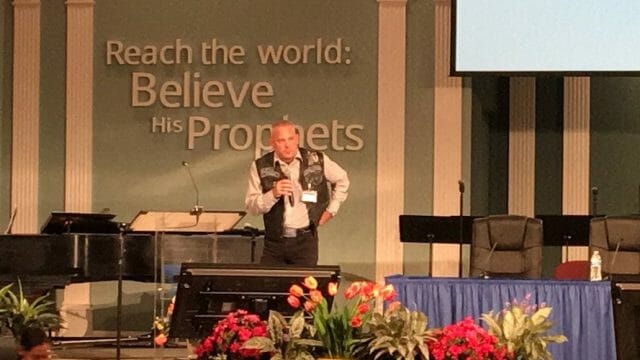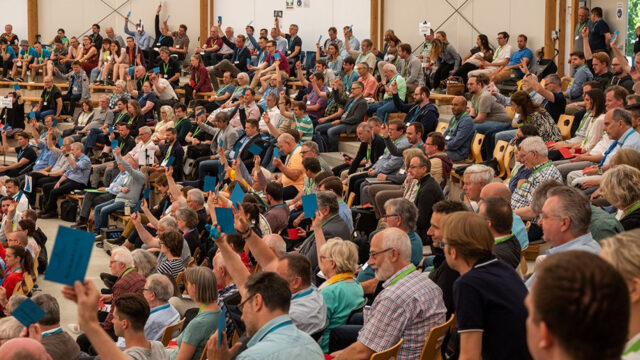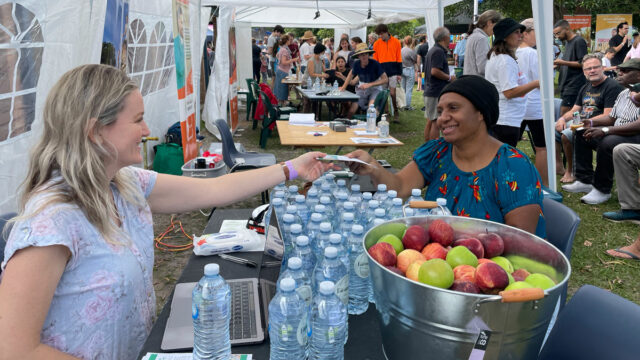Enactus team visited the country as they implemented their eLibrary initiative.

It was one of the best moments of a whirlwind trip delivering flash drives loaded with educational curriculum to schools in Nepal — La Sierra University Enactus team member Abigail Ramos took out her phone to show Nepali youngsters a video of a Southern California beach in the U.S. The children clambered over each other in their eagerness to witness something they had never seen before — waves crashing on a sandy shoreline. Another Enactus team member snapped a picture of the scene.
“It’s my favorite photo of the entire trip,” Ramos said. “They had never seen the beach before. They were so excited by the idea of the ocean and sand.”
The Nepali students at the school were on vacation but showed up to their campus anyway when the Enactus team arrived as part of their week-long Nepal outreach. The expedition was an expansion of the team’s eLibrary project during the university students’ own spring break.
“One hundred fifty students had come on their day off in uniform because they heard that Americans are bringing computers and education for them,” recalled Ramos, who served as leader of the Enactus eLibrary project and as a member of the La Sierra Enactus competition presentation team. “That was one of those moments that [you] breathe in and you’re like, oh my gosh, I’m doing something great. They were the sweetest kids.”
Enactus is a global nonprofit based in Springfield, Missouri, U.S.A, that encourages students at universities and colleges around the world to use innovative and entrepreneurial business principles in developing projects that transform lives in a sustainable way. The organization is supported by major corporations. During the last week of March, three members of the 25-member La Sierra University Enactus team brought to Nepal 600 flash drives loaded with thousands of pages of current, culturally relevant, and open-source educational curriculum with videos, as well as 100 computers intended for a total of 52 impoverished and Internet-bereft schools. The outreach ultimately impacts 16,000 students in Nepal.
In April, less than a month after the journey to Nepal, the Enactus team traveled to the Enactus U.S. National Exposition in Richardson, Texas, at the University of Texas at Dallas where they competed against approximately 30 other teams from universities and colleges around the United States in World Cup qualifier events. La Sierra University Enactus placed third in their league in semi-final rounds, among the top 12 nationally at the Enactus exposition. The La Sierra team presented on results from the four-year-old eLibrary project and its expansion into Nepal, and the team’s Freight2Table program and new education branch, CultivatED. The latter initiative introduces local continuation high school students to a learning experience involving shipping container-based hydroponics agriculture and associated business practices.
At nationals, Brigham Young University-Hawaii took the championship and will represent the U.S. at the World Cup event in the Netherlands this fall, while Southern Adventist University placed third in the final round.
During Enactus competition, teams from contending schools deliver adjudicated multi-media presentations accompanied by printed annual reports detailing financials and sustainable, ongoing local or international projects as well as the number of individuals impacted. Competition judges are business executives who ask questions based on the presentations and annual reports.
Expedition Nepal
Enactus projects typically involve large amounts of time in planning and implementation and must be shoehorned in around team members’ class schedules. The Nepal expansion of eLibrary required an extensive preparation period during which needs assessments were conducted of schools in Nepal before Ramos began duplicating the flash drives from master drives using USB duplicators. To aid in implementation, the group established links with Nepali partner organizations through dozens of emails. Travel to Nepal involved a 15-hour journey with a layover in Qatar during which the La Sierra students finished their final class assignments and submitted them online from the airport. The team landed in Nepal’s capital, Kathmandu, with the flash drives safely tucked into their luggage. Their journey through security checkpoints was aided by formal letters from officials confirming the legitimacy of their travel.
After their arrival in Kathmandu, the three-person team immediately set to work the next day packaging the computers and drives and attaching labels and instructions. They delivered five computers and 10 drives each to nine of the targeted schools during their week in the South Asian nation. “Going to the schools was the best part of this trip,” Ramos said. “Those are the schools that either were really affected by poverty, are really affected by the [2015] earthquake…. the kids would always be so excited.”
The delivery process to schools sometimes involved long car drives from the team’s base in Kathmandu and one overnight trip. The students gave presentations and took photos with local leaders and showed teachers and students how to use the drives. They engaged with excited Nepali youth by displaying flash drive video content — NASA and solar system videos proved particularly popular, Ramos said. Three partner Nepali organizations, including RUDEC Nepal, helped deliver the remaining flash drives and computers around the country.
Driving Change
Implementing projects and interacting with vulnerable populations are often eye-opening experiences for Enactus students, who can observe the direct and potential impact in the lives of those most in need.
“There’s always that chance that maybe these educational resources [will] lead one of them to be an engineer,” Ramos said. “It’s no longer just a hypothetical.
“And for a lot of those students that I met last year [for CultivatED] and that we met this year, they just want someone to believe in them, they want someone to tell them that it’s possible to have a better future.”
La Sierra’s team, which has set a precedent for national and international Enactus championship wins, is based in the Zapara School of Business and involves students from across academic disciplines. The Enactus team is now focused on expanding the eLibrary project with an outreach trip planned this summer to the Micronesia archipelago of Palau, where team members will deliver educational curriculum flash drives to 24 schools, impacting 4,000 students.
The original version of this story was posted on the La Sierra University news site.





